The world has changed, and we have yet to understand by how much. Further to the economics of COVID, the globe faces movement towards meeting the UN (Paris) Accord of 2015 relating to climate change challenges as well as the UN Sustainable Development Goals (SDGs), explained Taro Kono, Minister for Administrative Reform and Regulatory Reform, Japan. Vinod Sekhar, Chairman and Group Chief Executive Officer, Petra Group, Malaysia who was the strategic partner for this meeting, hoped the meeting’s leaders will take their findings forward into the firms and nations to benefit our shared humanity. And, as Lisa Edwards, President and Chief Operating Officer, Diligent Corporation, USA, put it: Society and business leaders can no longer disengage – it is logical to have a strong business view: the bottom line is, we cannot afford to ignore the SDGs. David de Rothschild, Founder, Voice for Nature, United Kingdom accepted it is exciting to use components of the capital markets to reach to the SDGs and to slow distracting narratives. Sadly, he continued, the ESGs and SDGs have become a label to adopt but have no accountability, especially if targeting 2050 when those adopting the measures today will be absent. Lord Barker of Battle, Executive Chairman, En+ Group, United Kingdom emphasized the pandemic has created massive impacts on governments and especially the poor. This was a point accepted by Nadja Swarovski, Chair, Swarovski Foundation, United Kingdom – the SDGs are not known well enough. We must educate the people better to support adherence.
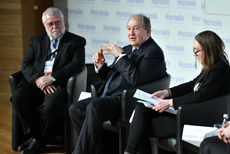 |
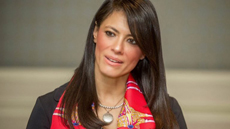 |
| Armen Sarkissian, President of Armenia, Armenia |
Rania A. Al-Mashat, Minister of International Cooperation, Egypt |
The US and Europe attempted to vaccinate most of their population to achieve ‘herd immunity’ whereby the lack of unvaccinated persons causes the spread of the virus to halt so protecting everyone. And, as Hank McKinnell, Chairman, Moody’s, USA, stressed, some nations have had less success, due to the personal worries of individuals about vaccination in general, and due to false information about COVID vaccinations in particular. The WTO hopes the vaccine hesitancy rate will decline rapidly as the hesitant see no harm has befallen those who are vaccinated. Miguel de Serpa Soares, Under-Secretary-General for Legal Affairs, United Nations discussed how the engagement the UN has placed on COVID – and said “we can’t go back to the old-normal”.
Defined as a pandemic, its effects were expected to be felt world-wide; and now, a year and a half after its appearance, its primary effects are yet to be felt in many developing economies. In the strong economies of China, the US and across Europe its effects are legion, not only in furloughing the leisure and hospitality sectors but also in their precise service industries such as airlines. Hemant Kanoria, Chairman, Srei Infrastructure Finance Limited, India accepted the second wave of COVID was really bad as it was more virulent: it was a Herculean task to manage. But other economic sectors have developed and thrived – the delivery of all types of goods to the home, and the newcomer: local hot food delivery and the packaged delivery of ingredients for meals with menus and cooking guides, concluded Michael Shvo, Chairman and Chief Executive Officer, SHVO, USA.
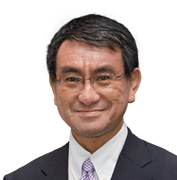 |
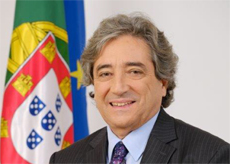 |
| Taro Kono, Minister for Administrative Reform and Regulatory Reform, Japan |
Ricardo Serrão Santos, Minister of the Sea, Portugal |
Once anti-viral drugs began to flow in greater numbers and the COVID cases reduced, economies began to grow. Economies recovered rapidly in China, the US and in the EU as pent-up demand due to confinement boredom broke free. According to Simona Kustec, Minister of Education, Science and Sport, Slovenia the demand has often been fueled by government cash for furloughing from government to person and then into the person’s bank: cash was in plentiful supply buy the goods as a celebration of the new freedom with many saying it is the end of COVID (though it has not been eradicated). Staff returned to work and had to learn a new set of distancing rules, wearing masks, and so on. Preeti Sinha, Executive Secretary, United Nations Capital Development Fund, United Nations stressed the future in terms of human development as it is difficult to achieve standard global level of living. We must create the concept of a ‘share’ in the form of a bond in which we can invest. Thus, when benefits accrue within the SDG it would create a new marketable concept: all will benefit.
Before the inauguration of US President Biden and during the months following, the trade embargos mainly against China imposed by former President Trump were felt more strongly across all economies. The US embargoes were often reciprocated. Economists predicted a global slowdown in GDP growth. Barbara Ann Bernard, Chief Executive Officer, Wincrest Capital, Bahamas concurs: that global recovery is uneven. She thinks inflation is here to stay as house prices (in the US) having doubled this year will not fall similarly next year. But individual investors can win – if one invests in commodities, they may outsmart inflationary trends – as governments go ‘green’ the value of copper and other basic commodities have risen. According to Annette Weisbach, Correspondent, CNBC, Germany, pundits have struggled with their description of the present indications of inflation, describing it as transitory.
As some economies re-opened customers gained confidence amid successful vaccine rollouts and upstream factory order books were buoyant again in the US and Europe, said Jenny Gilruth, Minister for Europe and International Development Government of Scotland. More recent data analyses indicate an inflationary trend as money searched for too few goods due to supply chain disruption and delays, as well as there being a shortage of trained staff across sectors. Péter Szijjártó, Minister of Foreign Affairs and Trade, Hungary said there is no magic mode for regeneration, but there is the beginning of a new age of global competition. In smaller nations like Hungary, in order to open up, they need vaccines and ultimately better local health support. Adrian Oros, Minister of Agriculture, Romania commented further on the effects of COVID that has left many local firms at risk especially as only the main EU nations within the EU are cared for, not the peripheral ones. New innovation is important to Romania as climate change responsibility needs water conservation and soil husbandry to grasp sustainably though it may be more costly. Julia Klöckner, Minister of Food, Agriculture and Consumer Protection, Germany noted climate change knows no borders and it is continually destroying agricultural land and increases aggression: we must invest in new aggrotech while reducing emissions.
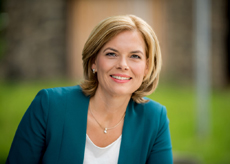 |
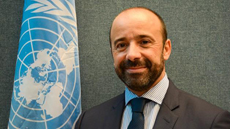 |
| Julia Klöckner, Minister of Food, Agriculture and Consumer Protection, Germany |
Miguel de Serpa Soares, Under-Secretary-General for Legal Affairs and UN Legal Counsel, United Nations |
It is clear that global nations, economically as well as politically, are as divided as ever, as Marta Morgan, Deputy Minister of Foreign Affairs, Canada put it. The US, Canada, Europe together with other developed nations are thriving, but are dependent on rebuilding their supply chains and buying from abroad rather than recreating factories in their nations. Questions have arisen about the nature and strategy of Europe following Brexit. Historically this is due in part to pressures noted by Albania – said Eduard Shalsi, Minister of State for the Protection of Entrepreneurship, Albania. Once we dreamed of being like Europe, but now we realize we are Albania with our own challenges including the linkages to global events like COVID. EU has demanded reforms from Albania, yet their own politics often blocked the accession of Albania despite the changes demanded of the Albanian people. Regionally, he continued, we see Albania is within the Balkan region and we ought to be joined as a whole to EU. Furthermore, compromise is not necessarily the best solution noted Carmelo Abela, Minister within the Office of the Prime Minister, Malta, it is not the lowest denominator, yet it represents the best possible solution at the present time. There is a need for an open strategic autonomy across EU, plus a stronger role for global institutions.
Africa has the world’s youngest population and will soon represent one-fifth of the world population. The continent is poised to become the world’s engine of growth. Manqoba B. Khumalo, Minister for Commerce, Industry and Trade, Eswatini celebrated the birth of the African Continental Free Trade Area which signals reductions in all restrictions to inter-African trade, aiming by 2035, to double its internal trade by enhancing its intellectual property rights, industrial development and supply chains. COVID-19 crisis has slowed us down. He ensures its youth must be part of the solution. Vera Esperança dos Santos Daves de Sousa, Minister of Finance, Angola stated Angola and other nations must change the ways in which Africa does business: to develop objectives for each nation and then between nations to define the strengths and objectives to reach global markets. Béata Habyarimana, Minister for Trade and Industry, Rwanda, informed how Rwanda has introduced reforms to make it easier for incoming businesses. Administrative reform was first; then regulatory reform; and then digital reforms: it has risen into the top 40 nations globally in the ease of doing business.
Europe and the US have, by and large, controlled their COVID outbreaks. But developing nations across South America, Africa and South-East Asia have yet to begin serious vaccination programs. Their vaccine production facilities and shipping modes are not yet re-secured from trade embargoes or from internal COVID issues. Despite vigorous financial rigor and rebuilding of real capacity as well as personal capacities, trust building will take some while, said Diego Mesa, Minister of Mines and Energy, Colombia. And, while Africa as well as parts of South and East Asia have a young demographic, every day all nations grow older so their governments must consider how they are to build wealth to generate social and health care for an eventual aging population. First, said Kris Gopalakrishnan, Chairman, Axilor Ventures and Co-founder, Infosys, India we must acknowledge the role of trust and facts, and need for a belief in science and technology to get vaccines into arms. We need philanthropy to be better applied. Soon health care should shift from the ill to the care of the healthy to determine their characteristics via remote sensing. Alan Patricof, Founder, Greycroft and Apax Partners, USA agreed, as people and staff are all at different stages within the COVID model.
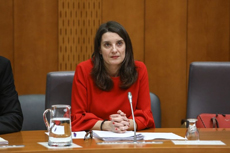 |
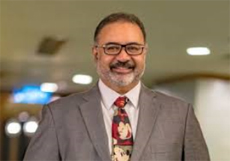 |
| Simona Kustec, Minister of Education, Science and Sport, Slovenia |
Vinod Sekhar, Chairman and Group Chief Executive Officer, Petra Group, Malaysia |
Many in the services industry will remain out of work for a while, or at least until flexible tourism returns when flights, hotels and restaurants will be free to accommodate people from short or long-haul flights, said Young Sohn, Chairman, HARMAN International, USA. And in the holiday locations, the shops need to be stocked and restocked with all the items people traditionally need. Megan J. Smith, Founder and Chief Executive Officer, shift7; Former CTO of the United States, USA said commercial economies are complex systems, and individuals, assembling products in the G7 nations or beyond wishing to buy and sell goods, will become frustrated by the economic frictions and blame their governments, though it is not wholly their fault. Frustrations are blind to reason – so political instabilities might arise affecting future elections and affecting geo-politics globally. Janez Cigler Kralj, Minister of Labor, Family, Social Affairs and Equal Opportunities, Slovenia said we must strengthen the responsiveness of labor market to absorb technological change accepting inclusiveness and greening generating a better life quality for all generations.
Somewhat at the center and often ignored, is the Greater Caspian Region. Murat Seitnepesov, Chairman, Caspian Week, Switzerland informed us of the region’s 500 million people, vast resources of gas, oil and minerals and entrepreneurs. There is a big future for growth though there are many internal issues. Lord Karan Bilimoria, President, Confederation of British Industry, United Kingdom while chairing the B7 in UK last year (a group consolidation the G7 businesses said it would be best to roll back global protectionism, giving greater emphasis on ‘going digital’ which has naturally been in focus during the COVID pandemic. As Lynn C. Fritz, Proprietor, Lynmar Estate, USA put it: we should ensure the WTO fully supports open trade, and after that any number of bi- or pluri-lateral accords are possible – recognising some accords are only possible as a global deal. A point that was emphasised by Deborah Wince-Smith, President, United States Council on Competitiveness, USA who noted that presently we are in a period of low competitiveness. Nations must be more competitive to deliver better solutions for their people based on stronger shared collaboration over digital platforms. Inequality, such as it is, comes from the inequality of education (and in many nations, the lack of good education for all). There is no harm in repeating that the future is education, education and education, said Ibukun Awosika, Chair, First Bank of Nigeria, Nigeria. And making sure this occurs globally – in so doing we will surely be Fostering Shared Humanity, concluded Kevin Abosch, Conceptual Artist and Pioneer in Cryptoart, Ireland.

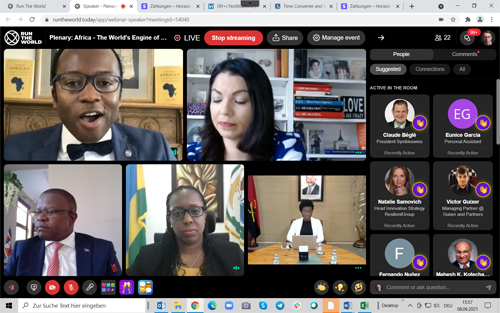








‘We are living a rapid revolution, not only in economy, but also in human behavior. “The industrial revolution is also happening in our human behavior. People want to have interaction, nowadays more people are watching electronic games than real physical games.’
Armen Sarkissian, President of Armenia
We in Namibia strongly work to reach inclusivity because we believe it is the best way of bringing harmony into society.
Hage G. Geingob, President of Namibia
We need to learn to work together as a whole world.
Princess Märtha Louise of Norway,
We are a country that likes to build bridges around the world. Bringing together people is the genius of the Portuguese.
Pedro Siza Vieira, Minister of Economy, Portugal
With good-will globalization is here to stay.
José Manuel Barroso, Vice Chairman, Goldman Sachs International; Former President, European Commission, Portugal.
We need to connect with the needs of the people... we need to build a narrative around people’s problems, explaining the trade-offs and being clear and transparent about the solutions and upcoming difficulties.
Susana Malcorra, Senior Advisor of IE School of Global Public Affairs, Former Minister of Foreign Affairs, Argentina
We need competence-based education in Latvia and the European Union, which includes team building, creative skills, community sharing, flexibility and mobility.
Dace Melbarde, Minister for Culture, Latvia
A strong EU is necessary in order to maintain peace and reach stability.
Dhurata Hoxha, Minister of European Integration, Kosovo
Exchanges are the agents of social and economic change.
Nandini Sukumar, Chief Executive Officer, The World Federation of Exchanges, United Kingdom
Globalization has completely different meanings in different regions. When we talk to our partners in Africa, all they want is a job, any job. We cannot use the same meaning in every part of the world.
Jerzy Kwiecinski, Minister of Investment and Economic Development, Poland